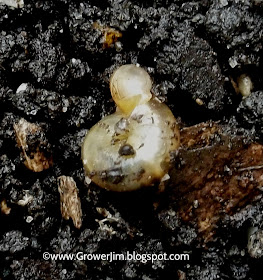 |
| Hot on the trail of the bad guy that ate that hole in the leaf! |
The Rosy Predator Snail (also known as the Rosy Wolf Snail) is widespread in Florida, but is also found in Georgia, South Carolina, Alabama, Mississippi, Louisiana, and Southeastern Texas.
The snail lives for up to two years, and one study showed that a single individual can consume more than 350 damaging snails in its lifetime. The Rosy Predator follows the slime trails of its prey in order to find its next meal. Small snails are eaten whole and larger snails are eaten live, right in the shell. Here's an adult feeding on a bush snail.
When the predators reach sexual maturity they search out a mate. Snails are hermaphroditic so both partners of a successful mating will be pregnant.
Approximately thirty eggs are laid at a time in the soil and these hatch in about a month.
They immediately begin exploring their territory and looking for prey.
Here's a baby predator feeding on a bush snail.
Newborn rosy predators are usually pale, but the shells develop more coloration as the snail grows.
When the predators reach sexual maturity they search out a mate. Snails are hermaphroditic so both partners of a successful mating will be pregnant.
Approximately thirty eggs are laid at a time in the soil and these hatch in about a month.
They immediately begin exploring their territory and looking for prey.
Here's a baby predator feeding on a bush snail.
Newborn rosy predators are usually pale, but the shells develop more coloration as the snail grows.
 |
| Young Rosy Predator |
In 1955, Euglandina rosea was sent to Hawaii in an attempt to control the invasive Giant African Snail. The newest inhabitants reproduced quickly, and within three years 12,000 Rosy Predators were collected to send to other tropical regions, including New Guinea, Okinawa, and the Philippines. Like most attempts to introduce predatory species into a new environment, this one ended in disaster. The Rosy Predator preferred to feed on the colorful native Hawaiian tree snails, eventually eating several species to extinction.
In areas where the Rosy Predator snail is native, it is a very beneficial creature to have living in your landscape. Gardeners can often find empty shells of the destructive Bush Snail where the Rosy Predator has been feeding.
 |
| Gone but not forgotten! |
Be on the lookout for this “good snail” and make it welcome in your garden!






A creature feature meme? What a great idea! I found one of these in my garden on the alocasias, and thankfully decided to take photos and let it be, since I don't like to kill pests in the garden anyways. The balcony is another story though... too little natural predators there.
ReplyDeleteWow, I didn't know that this was a "good" snail. I, fortunately, haven't had a snail problem and I guess that's why I don't see this one in my garden. I remember it from my childhood days though. I never realized it was eating all those little round ones. If I see one in my garden I will let it be. Perhaps it will eat some slugs. I do have a few of those. Thanks for the info.
ReplyDeleteI had one of those rosy critters in my garden just recently. I was surprised by its large size. I have way too many small snails that do lots of damage.
ReplyDeleteHi Jim, we don't have snail problems in our property but i see these snails in more wet and humid areas. Sometimes i see a bigger snail we call "Japanese snails" but i dont know the genus or species.
ReplyDeleteThis is a fun meme. In North Central Texas, we don't have these snails. However, I wonder what happens to the predatory snails when someone puts out the iron based slug bait. Do they eat it? Or what if they eat a snail that has consumed it?
ReplyDeleteStephanie Suesan Smith,Ph.D.
http://stephaniesuesansmith.com
I have been reading garden blogs for awhile now and I think I can safely say that snails are not a popular topic. Thanks for this post. It reminds me that I should look into the snails in my area a bit more too. I think they have changed a bit since I was a kid. There seems to be an invasive larger one among us not but I am simply not sure.
ReplyDeleteDear GJ now that is USEFUL!
ReplyDeleteBeneficial info and excellent design you got here! I want to thank you for sharing your ideas and putting the time into the stuff you publish! Great work!
ReplyDelete